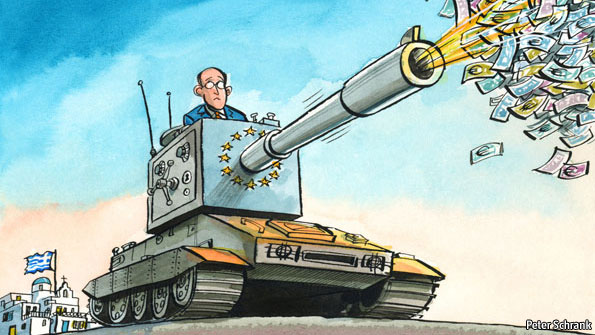
From Charlemagne, the Economist: Since 1949, Article 5 of the North Atlantic Treaty has bound NATO members to a solemn vow: an armed attack on one of the alliance shall be treated as an attack against all. With international markets closed to Greece, and contagion threatening Portugal and Spain, European Union leaders agreed to a similar pledge after a pair of gruelling, late-night meetings on May 7th and 9th.
From now on, they in effect declared, markets betting against one member of the euro zone would meet a swift [emphasis added] response from all 16. Emergency finance would be channelled to vulnerable governments from an array of fighting funds of up to €750 billion ($950 billion) variously loaned or guaranteed by EU countries, euro-zone members and the IMF (see article). …
From France there was crowing. President Nicolas Sarkozy claimed credit for a plan that he called “95%” French. He hailed the emergence of a new decision-making body at the EU’s inner core, made up of leaders from the 16 euro-zone countries. Such a “council of the euro zone”, as he called it, is not found in any EU treaty, but has been a French dream for years.
In Britain a scandalised press claimed the country could pay out anything between £10 billion ($15 billion) and £43 billion to prop up a single currency it did not even use. …
What the scheme is not is a giant leap towards a common economic government, with the power to siphon huge sums from rich to poor bits of the union. It looks more like a mutual defence pact: an attack on one euro-zone member is now an attack on all. Countries that sign up to NATO’s Article 5 make a serious commitment. They are asked to send troops for joint training, spend a certain amount on defence and so on. But their pact does not mean there is a single NATO army. (graphic: Peter Shrank/Economist)
Image: economist%205%2014%2010%20Financial%20fortress%20Europe.jpg
